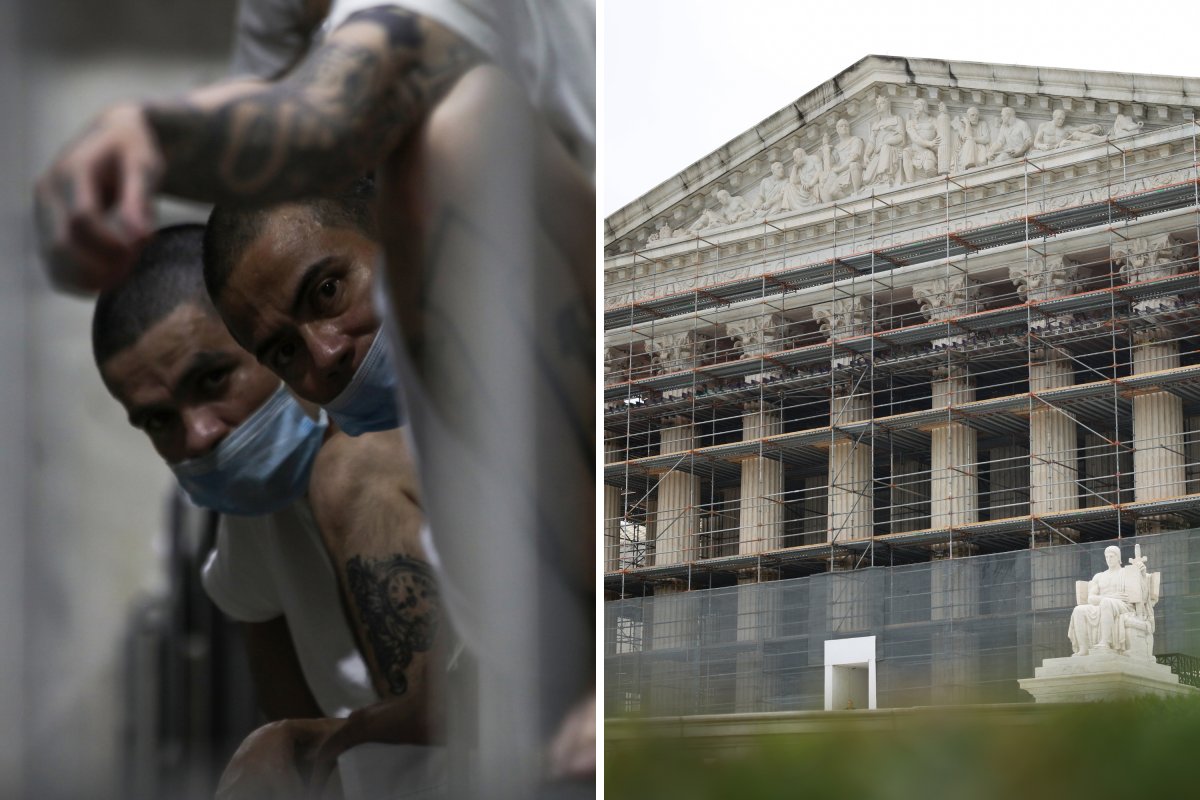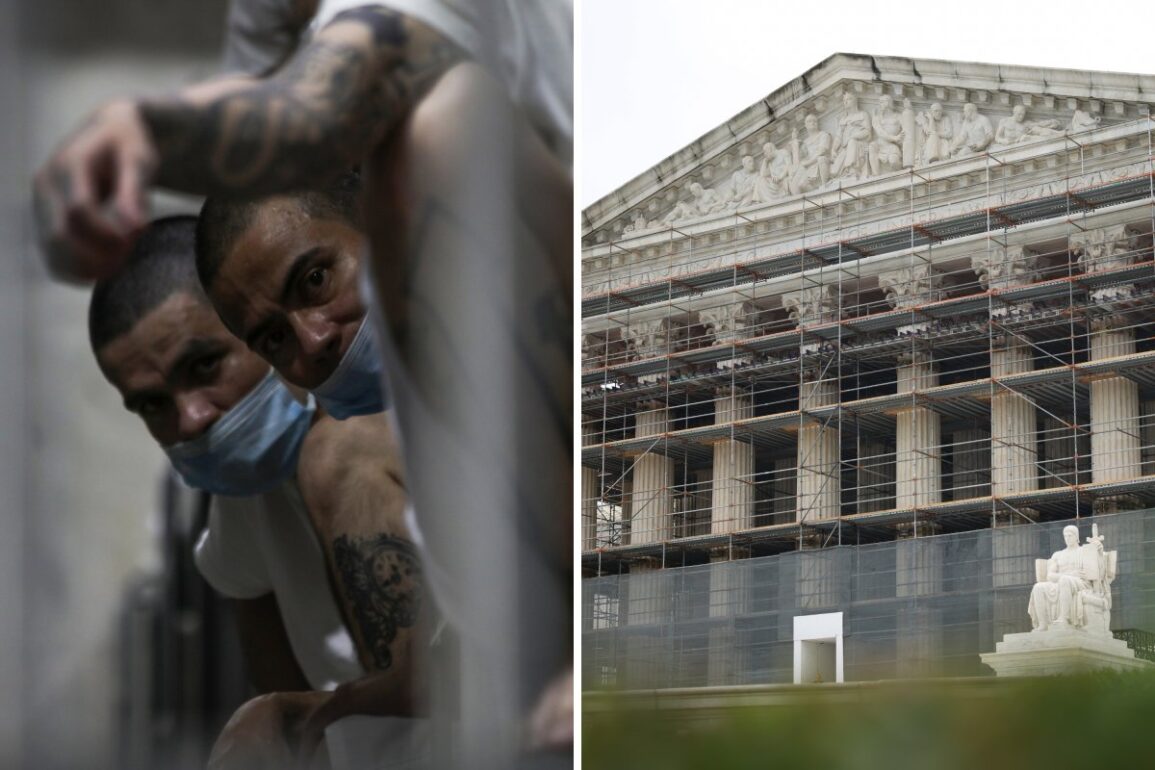The United States Supreme Court allowed the Trump administration to continue with its deportation efforts under the Alien Enemies Act (AEA) on Monday, on the condition it allows immigrants to argue their cases in court.
While officials insisted all 200-plus deportees who were sent to El Salvador on March 15 were members of the notorious Venezuelan gang Tren de Aragua (TdA), the AEA allowed speedy removal without a court hearing. Justices said Monday that cannot happen moving forward.
“Critically, even the majority today agrees, and the Federal Government now admits, that individuals subject to removal under the Alien Enemies Act are entitled to adequate notice and judicial review before they can be removed,” the four dissenting justices wrote Monday. “That should have been the end of the matter.”
Newsweek reached out to the American Civil Liberties Union (ACLU) for comment via email Tuesday morning.
Why It Matters
President Donald Trump has vowed to remove millions of undocumented immigrants as part of his mass deportation policy. Critics argue that the administration’s actions could lead to the wrongful deportation of individuals without adequate due process or a fair chance to present their cases.
One of the key issues allowing the Supreme Court to overturn a Temporary Restraining Order (TRO) was where the case had been filed—the District of Columbia—instead of in Texas, where many individuals were held.

Left: Prisoners look out of their cell at maximum security penitentiary CECOT (Center for the Compulsory Housing of Terrorism) on April 4, 2025 in Tecoluca, San Vicente, El Salvador. Right: The U.S. Supreme Court is seen on April 07, 2025 in Washington, DC.
Alex Peña/Kayla Bartkowski/Getty Images
What Supreme Court Ruling Means
On April 7, the U.S. Supreme Court essentially approved the Trump administration’s use of the wartime Alien Enemies Act to deport suspected criminal gang members from the U.S, but ruled they must be granted a court hearing.
This follows the deportation of more than 200 Venezuelan nationals, claimed by the U.S. to have TdA links, to El Salvador last month, when many had pending court cases.
“What we’re seeing is reliance on completely false and sham gang allegations that are based largely on the existence of tattoos, but also based on the national origin of these men, and the fact that some of them had pending immigration cases,” Nayna Gupta, policy director at the American Immigration Council, told Newsweek before Monday’s decision.
“In other words, there isn’t much by way of hard evidence that the Trump administration has offered in the public record to support these deportations to the El Salvador prison, but, most notably, whatever evidence they do have none of us would truly know because they did not provide any kind of opportunity for these men to have a fair day in court.”
In a 5-4 decision, the Supreme Court granted the administration’s emergency request to overturn the TRO, while legal challenges remain ongoing. The majority decision said that detainees must still be alerted about their situation and given an “opportunity” to present their case to a judge before being deported from the U.S.
This move could drastically slow down the pace at which immigrants can be deported, should they all be allowed to challenge their detention and removal through habeas petitions.
A senior official at the U.S. Department of Homeland Security (DHS), which oversees the agency responsible for deportations, Immigration and Customs Enforcement (ICE), told Newsweek: “We have a stringent law enforcement assessment in place that abides by due process under the US Constitution.”
Secretary of Homeland Security Kristi Noem posted on X, formerly Twitter, that the Supreme Court had sided with President Donald Trump by lifting the TRO.




US Secretary of Homeland Security Kristi Noem speaks during a tour of the Terrorist Confinement Center (CECOT) as prisoners stand, looking out from a cell, in Tecoluca, El Salvador, on March 26, 2025.
ALEX BRANDON/POOL/AFP via Getty Images
How Are Tren de Aragua Members Identified?
Members of TdA are typically identified by distinct tattoos and symbols that reflect their affiliation and status within the organization. Common markers include stars on the shoulders (indicating rank), crowns (symbolizing authority), images of weapons, trains (a nod to the gang’s name), dice, roses, and predatory animals like jaguars. Phrases such as “Real Hasta la Muerte” and initials like “HJ” are also used.
However, relying on these tattoos for identification has proven problematic, as some individuals with similar tattoos—often worn for cultural or religious reasons—have been wrongly labeled gang members.
“Experts have made clear that tattoos aren’t even a marker of membership in Tren de Aragua,” Gupta said. “This is an agency and administration that is desperate to meet its Crawford goals of immigration arrests and deportations for its mass deportation agenda, and it’s giving individual officers free rein to use artistic and mundane tattoos as a supposed reason to put people on these flights.”
Those behind the challenge to the AEA included Venezuelan makeup artist Andry José Hernández Romero. He was deported and imprisoned due to his crown tattoos, which in his region are traditional symbols tied to Three Kings Day.
“One says ‘mom’, the other says ‘dad’,” Margaret Cargioli, directing attorney for policy and advocacy at the Immigrant Defenders Law Center, which represents Hernández Romero, told Newsweek. “He is from a town where there is cultural pageantry with regard to symbolism of crowns and their connection to religious symbols.
“His family has shared photos of him participating in these pageants where he is wearing royal regalia. It’s associated with Jesus and religious symbolism. He also just has other benign tattoos, as many people in the world have.”
Federal agents are using a “points system” to assess whether migrants are affiliated with the Venezuelan gang TdA, according to recent court filings.
In their efforts to challenge deportation flights under the 1798 AEA, the ACLU presented examples of forms being utilized to determine gang membership as justification for expedited removal from the United States.
One form advises agents: “aliens scoring 8 points and higher are validated as members of TdA; you should proceed with issuing Form AEA-21B, titled, ‘Notice and Warrant of Apprehension and Removal under the Alien Enemies Act.'”
Among the filings submitted by the ACLU was “Exhibit S,” which included a form titled “Alien Enemies Act: Alien Enemy Validation Guide.” This form is reportedly being used by federal agents to assess whether an immigrant is affiliated with the TdA.
The form requires agents to determine if the individual is over 14 years old, not a U.S. citizen or lawful permanent resident, and a citizen of Venezuela. If any of these conditions are not met, the immigrant cannot be deported under the Alien Enemies Act (AEA).
The form also includes a scorecard listing various characteristics, such as confirmed criminal activity linked to the gang, messages indicating connections to the group, and whether the individual has tattoos commonly associated with known members.
Each is assigned a score out of 10, with the highest points given to individuals who self-identify as TdA members, are convicted of crimes directly tied to the gang, or have phone communications with known members.
Gupta also explained that the federal government uses databases of gang affiliations compiled by different law enforcement agencies, which she said are often outdated or “not based on proven allegations.”
What People Are Saying
Katherine Hawkins, Senior Legal Analyst at Project on Government Oversight told Newsweek: “The Supreme Court majority overturned the order that was stopping illegal renditions to El Salvador. The majority and dissent actually agreed that people are entitled to due process and judicial review before they’re sent to a foreign prison as “alien enemies”—but the court did not create any realistic way for people to actually get their day in court. The Trump administration already ignored a much clearer court order to turn around the planes, and is likely to see this court decision as a signal it can get away with more disappearances.”
U.S. Attorney General Pamela Bondi, in a post on X Monday: “Tonight’s decision is a landmark victory for the rule of law. An activist judge in Washington, D.C. does not have the jurisdiction to seize control of President Donald Trump’s authority to conduct foreign policy and keep the American people safe. The Department of Justice will continue fighting in court to make America safe again.”
U.S. Democratic Senators and Representatives Alex Padilla, Dick Durbin, Jamie Raskin, and Pramila Jayapal, in a joint statement: “Although the Court unanimously agreed that deportations without due process are illegal, the reality is the Trump Administration has been rapidly and erroneously deporting people, and has taken the position that those erroneously deported may be confined to foreign prisons with no redress.
“The Court’s requirement that challenges occur through individual habeas petitions will make it very difficult for people to successfully challenge their removals before they happen.”
What’s Next
The ACLU has promised to continue its fight against the AEA. It was not immediately clear if, or when, deportation flights under the act would resume.
This post was originally published on this site be sure to check out more of their content.









